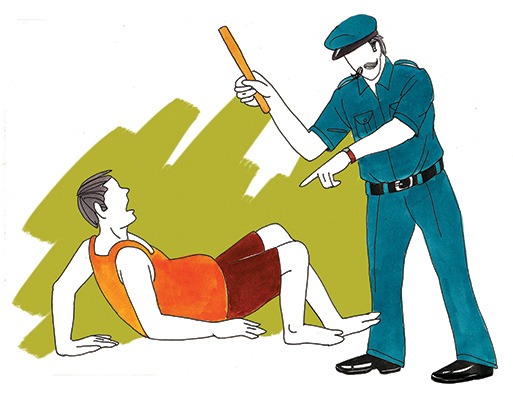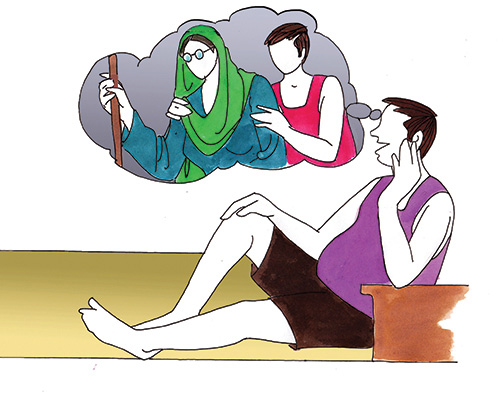The construction of the house went on at a fast pace. Sometimes it would be interrupted due to rains or want of sand or the absence of the mason. But Kanhu never left the place and his master was happy with him and patted him, showing his appreciation.
Kanhu sometimes missed his village and always remembered his mother and felt her absence. When he expressed his feelings, his master said that if he left the work would stop. He praised Kanhu’s dedication and let him feel that he was indispensable. Kanhu smiled with satisfaction and forgot about going to his village.
One day, he ventured to ask, ‘Once the work is over, I will bring my mother here. Can she stay with us?’
The master was worried about the completion of the work and the problems associated with it.
The expenditure was escalating.
He nodded in response to Kanhu’s query and said absently, ‘Yes, yes, she can stay.’
By the time the labourers and the mason finished work, it was well past the evening. Then they cleaned the implements, put them in the store, and washed away their grime. Kanhu would refuse to run the pump and ask them to lift water from the well in the bucket. This irritated the workers and they berated him. Then they would leave and Kanhu would be all alone.
The labourers had their lunch in the shade of the house. But Kanhu always had his in the small room.
He dreamt of the day when the house would be completed and he would stay in that room with his mother.
The roof casting was done; only the finishing work was left. He sat in the room late into the evening counting the days. Rain, storm, lightning, nothing perturbed him. He would sit there and stare at the sky through the open window. He counted the stars and even identified some as his or his master’s. He sometimes talked with the wind that usually blew in the evening. Then he would put some chewing tobacco in his mouth and try to whistle. Then he would go up to the roof, sit there and stare at the row of buildings that lined the horizon. He used to wonder at the sight. Perhaps there were more buildings in the area than trees in this village, he thought in nhhis youthful innocence.
Then he would remember his mother and his friends.
He remembered the large banyan tree near the crossing adjacent to his house. He remembered the red fruits of the banyan tree hanging from its enormous branches and even littering the muddy road.
He remembered the scene where the mouse picked on those tiny fruits and ate them with relish. He missed them all.
He was not scared of anyone in the village except that raging bull and mad Madhav, who, it was rumoured, lifted small children and took them away. Kanhu shuddered at the thought.
He realised it was time for his mother to be back from work and wondered how she passed time in her loneliness. Tears would well at the corners of his eyes. He then reassured himself that the day was not far when he would bring his mother here. They would stay together in this house.
The wind did not understand Kanhu’s words, neither did the stars, nor the clouds or trees. But he felt happy. Then he would come down, put on the heater and cook his rice and dal, mixed with vegetables.
It would take an hour. He would have his simple dinner and sleep in his room.
Days passed by. The construction work made progress.
Kanhu kept tabs on the progress of work. Day by day, the house began to look good. But, his master and mistress were worried. The budget was being over-shot and money was running out. Marble and wood works were costly. The carpenter was delaying the work. They had to finish the house within a month as time was running out.
This upset both of them to the point of irritation.
Kanhu approached the mistress as if to ask something. She walked away to avoid him and Kanhu remained speechless.
The out-house was dismantled to accommodate the sewerage tank. Kanhu did not object as he had his own room in the house.
He picked up his belongings and went into his room. The carpenter had kept his implements there. This upset him and he commanded the carpenter to remove them, not forgetting to mention that the room was his.
Finally, the day came when the housewarming puja (prayer ceremony) was offered. Kanhu was presented with a new shirt, which he wore on that occasion.
The pundit (priest) blessed him and the junior manager was very happy. He went around the neighbourhood with pride.
Master asked him to open the bamboo raft as the work had been completed.
The mistress called her husband aside and told him that Kanhu has been insisting on bringing his mother here. He looked at the gleaming house and then glanced at the dark and unkempt boy.
‘Tomorrow, Ramesh Tihadi is coming. We shall see,’ he informed his wife.
On Tihadi’s arrival, Kanhu was summoned to the master’s official residence. He served coffee and snacks to Tihadi.
Master took Tihadi aside and handed over three hundred rupees.
He said something to him which surprised Tihadi, ‘Is that so, sir?’
Then he came up to Kanhu and said, ‘Let’s go.’
The mistress told Kanhu that he had not been to his village for
a long while.
‘You go to your village now. I have sent sweets for your mother.
We shall call you later and you can come with your mother,’ she said.
Kanhu left with excitement as he had long wanted to hear this.
He followed Ramesh Tihadi out of the house, on their way to the bus stand.
‘What a mad boy. He will keep blubbering to Tihadi on the journey,’ said the master.
Both the owner and his wife smiled with satisfaction.
‘Whatever you say, it would not have been possible to build the house without Kanhu’s presence,’ she said.
‘No one is indispensable,’ her husband remarked.
Two weeks passed and Tihadi did not come. That upset Kanhu.
After all, he had to go back to the city with his mother.
His mother, meanwhile, refused to go to the city in spite of all Kanhu’s persuasions. That upset him even more. He was thinking of all the unfinished work he had left behind. He was anxious to go back, but his mother would not budge.
‘They are big people. How can we stay with them?’ was her stock reply.
Kanhu refused to listen.
The beautiful house and his small room inside it flashed before his eyes. He felt all the work would have come to a standstill in his absence. One fine morning he left for the city by a bus. When the bus conductor asked where he would go, ‘Bhubaneswar,’ he said.
On reaching the new house, he could hardly recognise it.
There was a signboard up there.

He saw a man dressed in cream coloured shirt and brown trousers standing in front of the gate.
As he tried to enter the house, the guard stopped him and asked, ‘Where are you going?’
‘I am going to my house,’ he replied casually.
‘Your house?’ The man looked at the boy with disdain.
Kanhu hesitated slightly as he felt that the man did not recognise him.
‘I am Kanhu. Are the master and the mistress inside?’
‘No one is inside,’ the man replied loudly.
‘And Bubu?’
‘Who’s he?’
‘Master’s son.’
‘Oh! You are asking about Mr Patnaik?’
‘Yes. Are they inside?’
‘No. This house has been taken on rent by the Hilton Company for their guest house.’
Kanhu did not believe him.
He jumped around the man and barged inside. He was well acquainted with the house. But he was astonished to see his room occupied with costly furniture, a television set and a carpet on the floor. He looked around bewildered as he caressed the TV set and felt the softness of the carpet under his feet.
The guard burst in and dragged Kanhu out of the house.
‘Bloody thief,’ he murmured.
Kanhu was consumed with anger.
‘Wait till I return from the master’s house. I will see you.’
‘Alright. Go. Mr. Patnaik and his family have left for Delhi. You say you worked for him and you don’t even know that he has been relieved from here and joined a post in Delhi!’
‘Relief, what relief?’
Kanhu asked anxiously.
‘Relieved from his post, idiot.
They were only waiting for the completion of the house. Or else, they would have left much earlier,’ the guard replied, putting the issue at rest.
Kanhu was flabbergasted. Master and Mistress had left? Where would he go then? And why was this man preventing him from entering his own house? He was destined to live here with his mother.
He pleaded with the guard.
‘Listen. I am Kanhu, the Junior Manager of this house. I have done the supervision of the work and
I lived here.’
The guard looked at him. He pointed at the stack of bamboo lying in the corner.
‘What is that?’ he asked.
‘Bamboo. It was used for the construction work,’ he replied innocently.
‘Why is it lying in the corner?’
‘The work is over, they are not needed any more.’
‘You understand that, don’t you? Can’t you understand that now your work is completed and you are not needed anymore?’
‘But where will I stay?’
The guard looked at the foolish boy with disgust and turned his face away and said,
‘How can I make him understand?’
Stung by the deceit of his master, the innocent boy looked around him in desperation. He had lived here and dreamed about his future and now everything lay shattered.
Then he chanced to see the mason, who had worked on the house, going past on his moped. Kanhu shouted and called him.
He heard and looked back, then he turned his bike and came back.
He smiled at Kanhu, ‘Where have you been? I have been looking for you.’
‘Look. This man is not allowing me to go into this house,’
Kanhu complained.
The mason looked at the guard and he looked back. Both smiled.
The mason explained to Kanhu that his master and mistress had left, giving the house to a company.
‘But, where will I stay?’ Kanhu asked, his voice breaking.
‘Do you want another job?
Mr Sharma is constructing his house in Barmunda, he needs a boy.
Do you want to work there?’
That was not the answer he wanted to hear. He looked back at the house again and again. He could not accept the fact that his master and mistress had lied to him.
The mason asked again, ‘Tell me.
Do you want to go?’
Kanhu could not reply. He stood rooted to the pavement.
Vehicles passed by in front of him, as did many people. The mason’s Luna also disappeared into the crowd.
Kanhu stood there undecided; how could he leave his home?
- Goura Hari Das (Translated from Odiya by Saroj Mishra)


